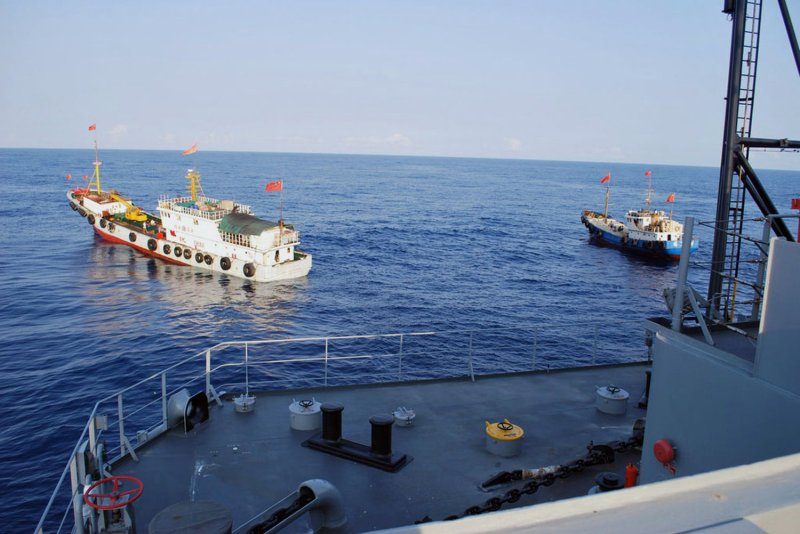Two Chinese trawlers stop directly in front of the military Sealift Command ocean surveillance ship USNS Impeccable (T-AGOS-23), forcing the ship to conduct an emergency "all stop" in order to avoid collision in the South China Sea on March 8, 2009. The incident took place in international waters in the South China Sea about 75 miles south of Hainan Island. The trawlers came within 25 feet of Impeccable, as part of an apparent coordinated effort to harass the unarmed ocean surveillance ship. (UPI Photo/U.S. Navy) |
License Photo
WASHINGTON, June 25 (UPI) -- The Global Ocean Commission says the lawless high seas -- the parts of the world's oceans outside the jurisdiction of individual governments -- are being degraded by pollution, overfishing and drilling.
"The high seas are like a failed state," said commission co-chair David Miliband, former foreign secretary of the United Kingdom.
"Poor governance and the absence of policing and management mean valuable resources are unprotected or being squandered," Miliband added. "The high seas belong to us all. We know what needs to be done but we can't do it alone. A joint mission must be our priority."
The group has published a report calling for sweeping reforms to reverse the decline of the ocean's health.
The "five-year rescue package" offers a number of broad policy recommendations. It calls on the United Nations and national governments to explicitly outlaw fishing in international waters and for stronger international cooperation on marine issues. Similarly it calls for a more concerted effort by world leaders and government to stop ocean pollution and guard against illegal fishing.
Maybe most interestingly, the commission calls on the world's wealthier nations to stop subsidizing commercial fishing on the high seas. The United States, Japan, China, and many European countries shell out some $27 billion to subsidize the vessels -- mainly via fuel subsides -- that plunder the high seas' fishing stocks.
"We should end subsidies for high seas fishing," argued Miliband. "When it comes to subsidies for industrial-scale resource extraction, like industrial fishing on the high seas, we are doing a huge disservice to future generations."
The commission delivered the report this week with the hope that it would spur action on the international stage. The U.N. is set to meet in New York in September to discuss climate change and other environmental issues.
The Global Ocean Commission is an independent group organized by former world leaders and ocean experts; it's funded by the Adessium Foundation, Oceans 5, and Pew Charitable Trusts.















